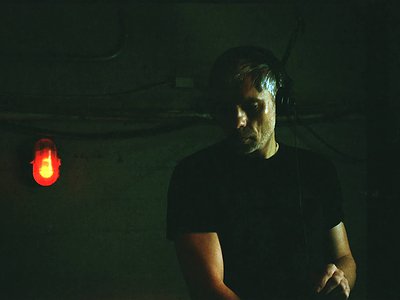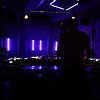Name: Fiedel / Michael Fiedler
Nationality: German
Occupation: DJ, producer
Current Event: Fiedel's new vinyl-only imprint SUPER SOUND TOOL has just launched. Check out the first release by Mode_1 and Duncan Macdonald here.
Recommendations: Book: Hunter S. Thompson „Fear And Loathing In Las Vegas“. Music: Miles Davis: „Bitches Brew“.
If you enjoyed this interview with Fiedel, visit his ultra minimalist website or his soundcloud profile.
When did you start Djing? What or who were your early passions and influences? What is it about music and/or sound that drew you to it?
I started when I was about 14, which was around the years 1986/87. Back then, in the former GDR, I couldn't buy records of the music I liked. Instead I recorded tapes from the radio and played them at school and private parties. I had to borrow a second tape recorder for winding the cassettes according to my lists containing the counter numbers.
Early influences for me were Hip Hop (Mantronix, Egyptian Lover, Sparky D, BDP), Synth Pop (Kraftwerk, Depeche Mode, Yazoo), House (Farley Jackmaster Funk, Ralphi Rosario, Todd Terry, Lil Louis), Acid (Tyree Cooper, Bam Bam, Phuture, Roxanne Shante, Baby Ford) and the sample based studio projects/tracks that emerged at that time (Bomb The Bass, M.A.R.R.S., Eric B & Rakim, Westbam).
I could detect a special vibe in these styles of dance music, which is still present in the music that I play today. The music contained driving rhythms and sweet melodies. The structure was broken up and removed stiffness and predictability. This was fresh. And there was the yearning for a different place to be.
Listening to West-Berlin radio was like a window to the world. Especially Monika Dietl's radio show „Heartbeats Per Minute“ was very influential to me (if I could receive a decent broadcast signal). She played different sorts of music: Dance, Hip Hop, West Coast Electro, Miami Bass, New York Garage, Chicago House, Acid, New Beat, Aphex Twin etc. and featured artists in interviews and DJ mixes.
But also the East-Berlin radio was quite open in terms of music. Whether it was wanted or just tolerated, it was a source of good music too. There were show featuring complete LPs and 12inch maxis. I remember listening and recording radio shows by Olaf Zimmermann. Through his adventurous operations he was able to play on the edge electronic music in East German radio. He still moderates shows at the radio today. Last year we met for an interview in the studio.
For most artists, originality is first preceded by a phase of learning and, often, emulating others. What was this like for you? How would you describe your own development as an artist and the transition towards your own voice? What is the the relationship between copying, learning and your own creativity?
I always went for catching this special vibe I felt, so I never copied somebody. I had my very own vision and to my luck some people could follow. This included versatility ever since I started playing out in public.
I admit that sometimes I liked a track that another DJ had played. I found out what it was and bought it. But in the end I learned, it mostly didn't fit into my sets, because every DJ had a different approach of putting a mix together. So I stopped doing it and rather enjoyed other DJs' sets without exactly knowing what they were playing. I kept on digging my own stuff which helped me make my musical vision become reality.
As for learning the techniques how to DJ, I attentively watched DJs in the club for a while. But it wasn't decksharking at all. I was rather listening to what they were doing (while dancing and raving) and occasionally comparing it with their fader movements. Everything else I learned completely on my own at home. When I was a teenager, my dream was always to own 2 turntables and a mixer and play music to an audience. But that had to wait until the wall came down, now 30 years ago.
What were some of the main challenges and goals when starting out as a DJ? How have they changed over time? What is it about Djing, compared to, say, producing your own music, that makes it interesting for you?
I learned that not everyone liked the music I wanted to hear. At school parties you had to compromise. You wanted your fellow students dancing and havíng fun. Once they had that, you could try to persuade them. The strange thing I felt when listening to my preferred music wasn't obvious to everybody (and it still isn't).
Hence, my goal is to make people dance with the music I would like to dance to. I'd like to invite the audience to join in on a trip with me, to show them my world and to share my experiences with them. The same is true for producing my own music. This approach didn't change at all over time.
How would you define the job and describe the influence of the DJ? How are the experience and the music transformed through your work?
The work as a DJ is basically 2 things: partly it is a job and partly it is passion. The job is to make sure that the people who payed at the door get what they were coming for: they want to be entertained. But it seems that many DJs nowadays see it solely as a job opportunity and make it their career choice to become famous and earn good money. Some years ago, the scene turned into a huge marketplace for different services. Depending on the amount of money you are able to put in and how much advertisement action you are willing to do, you climb your way up to the top while delivering your services, like it is the case in the regular economy. But the top of a market does not necessarily feature the best quality products, only those getting the most attention.
For me, the passion part is the more important thing. This mainstream economy situation allowes me to make a living out of my passion and enables me to travel the whole world. Fortunately, there are many people out there with whom I can share my passion. During a DJ set, I put many pieces together for a one-off experience. Be there or be square. It is always a matter of the situation in this very moment: the people present, your own mood and the music you decide to play. Creating an emotional flow is a greater goal for me than delivering a technically seamless and pure functional set.
What was your first set-up as DJ like? How and for what reasons has your set-up evolved over the years and what are currently some of the most important pieces of gear for you?
My first DJ set-up at home consisted of 2 Technics 1210MK2 turntables, equipped with a Stanton 890SA stylus each, and a Gemini PMX-12, which is a 2-channel battle mixer with no equaliser. We used this simple set-up at parties we threw in a local youth club in my hometown back in the early 1990s. My headphones are the Sennheiser HD-25. I recently sent my first pair into retirement after 25 years of use and bought a new pair. The mixer has changed to a Gemini PS-626, and unfortunately the styli too, since they are out of production. These needles were some of the best sounding and durable DJ pick-ups I've ever worked with.
Over the years I included CDJs into my performances, but I use them rather as digital turntables without the loop and synch stuff. This gives me the opprtunity to work with the tracks as they were intended by the artist. It sometimes causes surprises in how 2 tracks are going along together, similar to playing 2 records together. I just love that. It keeps the work with the music interesting, in comparison to pre-producing parts or using loops to make transitions. My approach to the technical side of DJing is a very basic one. I hardly make use of DJ effects or filters. In my experience, they wear off too soon during a DJ set. If you hear the fifth break in a row with the same filter action or that contains the same effect or white noise underneath, that is pretty boring.
A t some point I decided not to play vinyl anymore when I am touring. The reason is simple: the technical conditions aren't anymore suitable for playing vinyl records. Less technicians know how to provide a proper vinyl set-up without feedback or skipping needles, plus, the turntables aren't in the best shape. Since nobody is playing on them, it seems that the rental companies hold in stock the last remaining turntables on earth. The loudness war (in production, PA design and performance) and certain insufficiencies on recent DJ-mixers in use made it harder if not to say impossible to compete with the highly compressed digital material. Only through an intense soundcheck, partly restructuring stages and willing and capable technicians it was possible to obtain moderate working conditions.
Another phenomenon to mention is the way recent vinyl records are made: 2 rather long tracks are being cut onto the surface of a record in a standard mastering/cutting process without working out the possibilities this medium has to offer. The result is a less deep groove containing a less loud, less bassy and more compressed signal. It will make the DJ crank up the gains and eqs and it leads to a terrible feedback in the end.
I still play vinyl though in places I know, for instance at Berghain, because I just like the way of handling records and turntables and the way of being physically engaged while mixing the music. My newly founded vinyl only label „SUPER SOUND TOOL“ takes care of a proper cut and a great sound in order to make playing vinyl records fun again.
How do you make use of technology? In terms of the feedback mechanism between technology and creativity, what do humans excel at, what do machines excel at?
New technology is mostly invented to optimise processes and to take away unwanted work. This makes life much easier and more perfect, but it makes us more lazy too and it takes away responsibilities. You can call me old school, but there is nothing more powerful than skills you once learned. With all those automated items and processes the need to obtain a certain skill becomes obsolete, which I consider dangerous when it happens continuously. Intuition, alertness and the ability to cope with unforeseen circumstances will be erased.
Don't get me wrong, I am curiously open towards new developments. But I'd like to see if they can contribute to improve some aspects of my life and then I'd like decide whether to make use of them or not.
The approach of taking easy-to-use technology (and overall access to music) for granted and doing stuff that leads only to mediocre results is devaluating the work of a DJ. It feels like industrial mass production without personality and commitment to the music. There are only few DJs who can make use of modern DJ technology in a way that it turns into something new and worth hearing, like DJ Pete, Surgeon and Errorsmith for instance.



